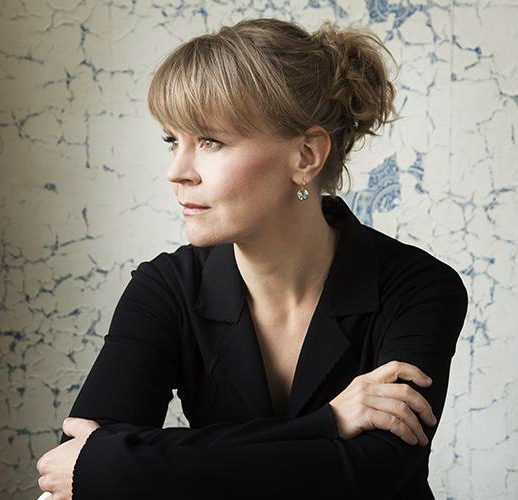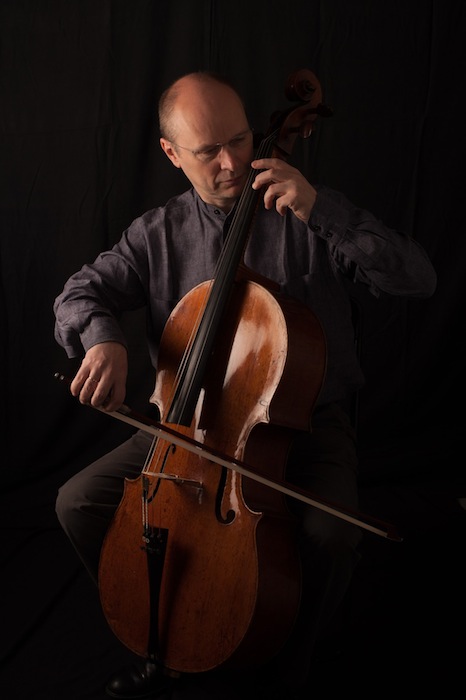Mälkki provides fresh, illuminating performances with New World

Susanna Mälkki conducted the New World Symphony in music of Debussy, Dutilleux and Rachmaninoff Saturday night. Photo: Simon Fowler
Among the attractions of concerts by the New World Symphony is the orchestra’s tradition of bringing the world’s leading conductors to South Florida.
On Saturday the Finnish conductor Susanna Mälkki stepped onto the podium, in a return visit for a conductor who is ascending into the upper echelon of her profession. A frequent guest with top U.S. and international orchestras, she was just named principal guest conductor of the Los Angeles Philharmonic.
In a concert at New World Center in Miami Beach, with a full crowd outside watching a broadcast from the adjacent park, she led a magnificent performance of brilliant French and Russian works that drew on the full range of colors that can only be produced by a symphony orchestra.
French composer Henri Dutilleux’s Tout un monde lointain… (A Whole Distant World…) is a cello concerto in all but name. Inspired by lines of poetry by Baudelaire, the five-movement work creates a unique sonic experience, with unusual combinations of instruments and sunbursts of unexpected harmonies. For all the mid-20th-century denseness of its harmonic fabric, the work is firmly rooted in the French tradition of orchestral sensuousness and brilliance that characterized the compositions of such predecessors as Chausson, Debussy and Ravel. Under Mälkki’s baton it came off with shimmering richness and moments of sudden dramatic force.
Handling the solo part was the Finnish cellist Anssi Karttunen. His official biography calls him a “passionate advocate of contemporary music,” which seems something of an understatement for a cellist who has performed more than 160 world premieres.
His mastery allowed him to bring out the work’s wide range of moods and textures. In the opening of the movement titled “Gaze,” in which he played in the instrument’s top range, he produced a bizarre and eerie sound to the accompaniment of somber chords in the winds. In “Mirrors,” he played with a rich, singing tone that could have fit a 19th-century work like the Dvořák concerto, with an accompaniment of harp and percussion that created a uniquely transparent and unearthly tone.
For the soloist, the piece is a virtuoso workout, with runs that span the instrument’s range, ghostly harmonics, and an emphasis on the cello’s very highest range. He threw himself into an energetic, intense performance, handling all of the work’s technical challenges and looking exhausted as he hit the final notes.
Rachmaninoff’s Symphonic Dances, the composer’s last work, is an orchestral showpiece on the order of Rimsky-Korsakov’s Scheherazade, full of melody and fantastical orchestral effects. Under Mälkki’s baton, the orchestra gave a performance of great rhythmic verve and instrumental color, with magnificent crescendos, dazzling instrumental effects and climaxes that wrung every bit of energy from the music. Every time the clipped theme of the first movement returned, Mälkki subtly gave it more portent, drawing back the orchestra and then unleashing it with greater force and impact.
Yet this is also a work of sadness and nostalgia, and these elements came particularly to the forefront in this performance. The saxophone solo of the first movement was full of longing and melancholy, played by Thomas Snydacker with a plush tone that made the unusual scoring stand out. In the Andante, Mälkki led the waltz at an unusually slow tempo that rendered it especially ghostly and nostalgic, like a happy time recalled years later.
The concert opened with a brief work by Debussy, “Round Dances of Spring,” a movement from his Images for Orchestra. Mälkki led a pulsing, rhythmic performance that allowed the sensuality of the work’s orchestration and harmonies to emerge clearly with less of the fog and vagueness that often attend performances of the composer’s music.
The New World Symphony will repeat the program 2 p.m. Sunday at New World Center in Miami Beach. nws.edu; 305-673-3331.
Posted in Performances
Leave a Comment
Sun Apr 10, 2016
at 1:03 pm
No Comments







